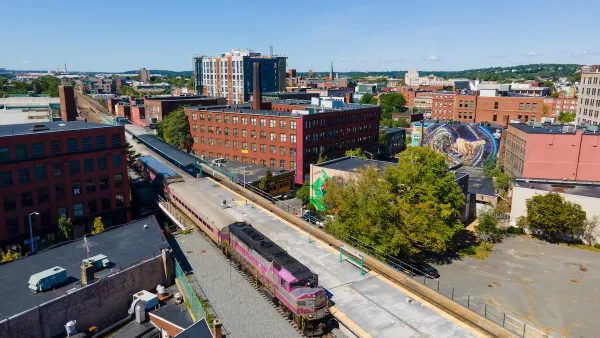The new ordinance brings long-awaited legal legitimacy to sidewalk vending in Los Angeles.

Sahra Sulaiman writes of the details of a Los Angeles City Council committee hearing this week that preceded the approval by the full council of a new ordinance that brings the city into conformity with state law and begins the process for the city to create a permitting process for sidewalk vendors.
State law SB 946, signed by Governor Jerry Brown earlier this year, decriminalized sidewalk vending, and was touted as a victory social justice, but a defeat for local control. Sulaiman explains that the law hadn't done much to improve the situation for sidewalk vendors in Los Angeles, yet:
Even with the decriminalization of sidewalk vending last year, the lack of a formal ordinance meant street vendors were still experiencing harassment from law enforcement, racking up hefty fines they struggled to pay off, and worrying about deportation. It was eating into their livelihoods and making them afraid of losing everything every time they set up their goods.
To address the state law, the city proposed two alternatives for its sidewalk vending ordinance. One would have set up a regulatory model that "would have only required compliance with regulations," but also "it would not have generated funding for a monitoring and compliance program, making it much less attractive to the city."
Instead the city chose a permitting model, and final controversies over the ordinance centered around revisions to the draft ordinance and questions about vending in parks.
Sulaiman wrote the article after a joint meeting of the Public Works and Gang Reduction, Economic Development, and Arts, Entertainment, Parks, and River Committees on Tuesday, November 28, but also confirmed via Twitter that the ordinance had passed the full council on Wednesday, November 28.
Additional, up-to-date coverage by Emily Alpert Reyes has also been published by the Los Angeles Times.
FULL STORY: City Council Set to Approve Historic Sidewalk Vending Ordinance

Maui's Vacation Rental Debate Turns Ugly
Verbal attacks, misinformation campaigns and fistfights plague a high-stakes debate to convert thousands of vacation rentals into long-term housing.

Planetizen Federal Action Tracker
A weekly monitor of how Trump’s orders and actions are impacting planners and planning in America.

Chicago’s Ghost Rails
Just beneath the surface of the modern city lie the remnants of its expansive early 20th-century streetcar system.

Bend, Oregon Zoning Reforms Prioritize Small-Scale Housing
The city altered its zoning code to allow multi-family housing and eliminated parking mandates citywide.

Amtrak Cutting Jobs, Funding to High-Speed Rail
The agency plans to cut 10 percent of its workforce and has confirmed it will not fund new high-speed rail projects.

LA Denies Basic Services to Unhoused Residents
The city has repeatedly failed to respond to requests for trash pickup at encampment sites, and eliminated a program that provided mobile showers and toilets.
Urban Design for Planners 1: Software Tools
This six-course series explores essential urban design concepts using open source software and equips planners with the tools they need to participate fully in the urban design process.
Planning for Universal Design
Learn the tools for implementing Universal Design in planning regulations.
planning NEXT
Appalachian Highlands Housing Partners
Mpact (founded as Rail~Volution)
City of Camden Redevelopment Agency
City of Astoria
City of Portland
City of Laramie





























